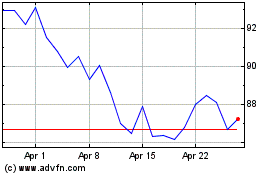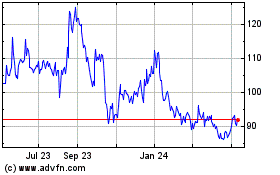By Bojan Pancevski
BERLIN- -- Germany could be one of the first Western countries
to start immunizing people against Covid-19 under a plan being
rolled out by the government and a German company that is testing a
vaccine, according to people with knowledge of the strategy.
The plan is for doses of the vaccine now being held in central
storage in Germany to be shipped to more than 60 regional
vaccination centers within hours of the substance being
approved.
This could happen before the end of the year depending on the
results of clinical trials now in their final stages and approval
by the European Medicines Agency, the European Union's equivalent
of the Food and Drug Administration.
Initial recipients would include health-care workers, the
elderly, clinically vulnerable people, law-enforcement officials
and people living in crowded conditions, according to lists being
drawn up by Germany's state governments, with the general public
coming several months later.
The preparations contrast with the U.S., where states have
expressed concerns that the federal government has yet to answer
critical questions about how many doses each state will get, how
these will be distributed and who would be eligible for the initial
jabs.
One reason for Germany's head-start: It is home to BioNTech SE,
one of the front-runners in the quest to develop a safe and
effective vaccine against the virus. The company is testing a jab
in partnership with Pfizer Inc. that it hopes to submit for
authorization in November.
It is also working with German regional health authorities to
set up vaccination centers across the country and deploy mobile
vaccination teams to nursing homes or remote rural areas, according
to German government officials and BioNTech representatives. It
will also train medical workers in how to store and administer the
vaccine.
BioNTech has begun storing doses of the vaccine at a secret
transport hub managed by an unidentified logistics company from
where the shots will be ferried to the centers located in Germany's
16 states immediately after approval, a company spokesperson
said.
One reason authorities opted for dedicated centers instead of
relying on doctors' and hospitals is that they are easier to secure
and monitor, guarding against both theft and the vaccination of
non-eligible recipients, according to a German health ministry
official.
BioNTech and Pfizer are already producing millions of doses to
be able to deliver on pre-purchasing contracts. BioNTech says that
they will be able to supply German authorities with vaccines hours
after they get authorization.
But the companies will be able to deliver only a limited amount
in the initial phase. So the government is rushing to draft rules
governing who will get the first shots. Eligible recipients will
need an appointment to get a jab, the ministry official said.
Bavaria, Germany's second-most populous state, has some of the
most advanced vaccination plans. It aims to inject vulnerable
groups such as the elderly, people with chronic conditions, and
employees and residents of nursing homes first, followed by medical
staff, police officers and firefighters. Nearly 2,000 Bavarian
doctors have already signed up to help.
A nationwide information campaign will explain the procedure and
the rationale behind the prioritization of certain groups,
according to two government officials. The effects of the
vaccination will be closely monitored and recipients will be asked
to enter any symptoms or side effects in an app that will be
launched together with the jabs, the health ministry said.
Not all European governments are as advanced with their vaccine
plans. Italy has said it would vaccinate health-care workers,
police and people with health risks first, but the government
hasn't decided yet whether it will distribute the vaccines through
family doctors, hospitals or dedicated centers.
Spain has created a working group of central and regional
governments that will draft the country's vaccination strategy. As
in Germany, the regions will oversee distribution and maintain a
national vaccination registry.
The U.K. government has secured access to 350 million doses
across six vaccines. A government official said that the country
was ensuring that vaccines were being manufactured now so that they
can be deployed when regulatory approval is received. However that
process could take several months as the logistical challenges to
acquire enough doses and inject people are huge.
Officials are working on creating mass vaccination sites where
thousands could receive the shot. Rules have been changed allowing
a wider array of people to administer a vaccine including
physiotherapists and student nurses.
On Tuesday, Kate Bingham, the head of the U.K. government's
Vaccine Taskforce, said that a jab may be approve before year-end
and rolled out by Christmas. Though she cautioned that it was more
likely to be next year.
She also warned of a manufacturing roadblock. Britain's access
to the vaccine is limited by the country's production capacity.
Earlier this month the government announced that two temporary
vaccine manufacturing hubs would be online by the end of October
capable of producing tens of millions of doses. A larger permanent
facility is due to open in 2021.
Back in Germany, the centers will be equipped with cooling
facilities. The BioNTech-Pfizer vaccine can be stored at
temperatures of up to 8 degrees Celsius for a week while for longer
periods they must be kept at a temperature of -75 degrees.
Germany will be supplied both vaccines via the EU, which has
preordered 200 million doses of the BioNTech-Pfizer vaccine. The
doses will be delivered over the course of several months and
Germany will receive at least 30 million extra vaccines under a
bilateral deal with BioNTech.
Government officials estimate it would take about seven months
to vaccinate everyone in Germany who wishes to do so.
Just over 50% of Germans would be willing to get a vaccine
according to a study by the Hamburg Center for Health Economics.
This mirrors similar numbers in other European countries.
"People who oppose vaccination are mainly those who feel their
health is not endangered by corona, and those who have no trust in
the information policy of their government," Jonas Schreyögg, head
of the institute, said.
--Max Colchester in London and Giovanni Legorano in Rome
contributed to this article.
Write to Bojan Pancevski at bojan.pancevski@wsj.com
(END) Dow Jones Newswires
October 29, 2020 12:57 ET (16:57 GMT)
Copyright (c) 2020 Dow Jones & Company, Inc.
BioNTech (NASDAQ:BNTX)
Historical Stock Chart
From Mar 2024 to Apr 2024

BioNTech (NASDAQ:BNTX)
Historical Stock Chart
From Apr 2023 to Apr 2024
